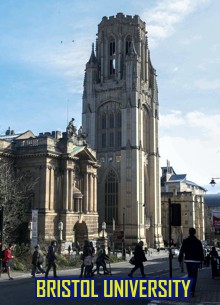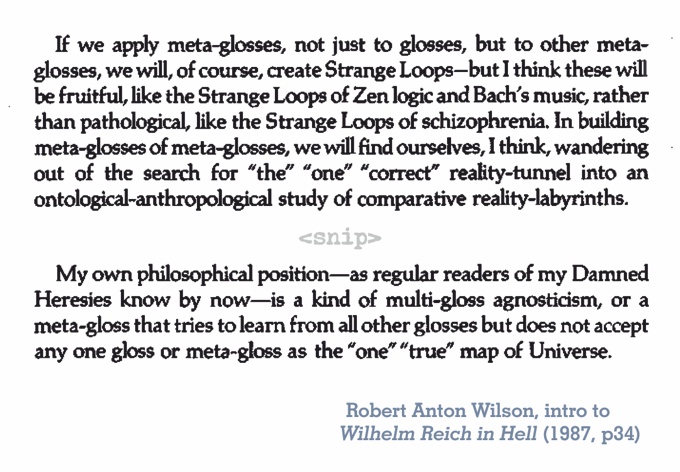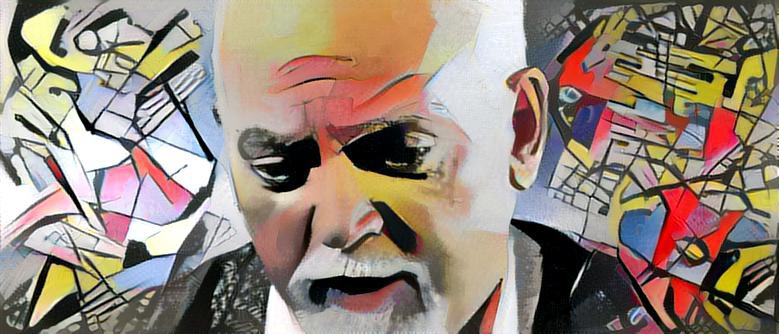I planned to post a piece about RAW’s critique of Plato’s metaphysics, but I think that needs a bit more “work” before I press the PUBLISH button. So, in the meantime, I’ll fill some space with an impromptu journal about RAW’s model agnosticism. It’s a one-take, off-top-of-my-head “pixel-spill”, so please don’t judge severely…
When I was at school, the sister of one of my friends had a really bad time, verging on “breakdown” (I was told) – but then she had some kind of “born again Christian” experience, which seemed to “cure” her (to the extent that she appeared happy, confident, etc, again).

Fast forward a few years: (circa 1980) I’m an undergraduate at Bristol University, where several cults hang out, trying to recruit students – Moonies, and a couple of newer “psychological” cults, etc. (One of my flatmates allowed a young “Hare Krishna” convert, who was halfway through an extended vow of silence, to sleep on the sofa in our living room for a few weeks. He communicated with us by notepad, illustrated by strange dreamlike doodles of angels).
I’d noticed, by that point, that most of these “true believers” (the ones I encountered) displayed a kind of happiness, and also seemed to emanate a “superior” sort of “serenity” or “certainty” which apparently gave them comfort. I felt a bit jealous, as I intuited that I didn’t have the “right” mentality to become a “believer”. This seemed a disadvantage to me at the time (this was a few years before I discovered RAW’s books). In some ways it still seems a disadvantage.
[To digress somewhat (feel free to skip): why the “wrong” mentality to become a believer? Well, to give an example, an attractive older woman at a party chatted me up before inviting me to one of the “events” that a “psychological” cult (that she belonged to) used to recruit students. She had, I thought, the “true believer” superiority mixed with sexiness and other-worldliness. So, I agreed to go along the next evening, out of, y’know, curiosity. I recall mentioning this to a couple of fellow architecture students in the university studio the next day, and jokingly asking if they knew where I could obtain a live goat at short notice, as I was supposed to take one along. They found that quite amusing, but I don’t think the creepy, sanctimonious alpha-male who (it turned out) led the cult recruitment event found it so amusing.]
If you listen to the really nice clip of RAW, below, (talking about why his “favourite religion” is Shinran Buddhism), you’ll see why not having a “believer” mentality can seem a disadvantage. You just can’t manage “true faith”! (post continues below video).
‘There are some people always asking questions, never satisfied, always asking the next question, always a little bit sceptical. I’m one of them. And we just can’t manage true faith – we’re always wondering, maybe there’s an alternative, maybe there’s another way of looking at it.’
RAW on Shinran Buddhism
As explained in the clip, Shinran Buddhism doesn’t require “true faith”, which is why RAW claims to like it. I don’t know much about Shinran Buddhism (even its Wikipedia entry seems over my head), but do you notice the paradox/irony in the notion (belief) that you will be saved by repetition of those words (mentioned in the clip) whether or not you have true faith about that!
Agnostic gift
The “reality selection” notion, as nicely illustrated by the cartoon in Prometheus Rising (arcade machine: “New Realities 25c – Crawl In”) probably has, as well as its philosophical implications, a lot of modern “consumer” type appeal. On that level it might make more sense to someone in relatively good health/circumstance – ie not in a life-threatening, or otherwise horrible, situation that practically limits one’s “reality selection” options, even in imagination.
On that level it would seem that people in dire situations might prefer something more “solid” and “certain” to lean on, to comfort them (this seems the selling point on many signs I see outside Christian churches – of which there are scores in my local region of north Wales). And those cults I encountered in my student days weren’t offering epistemological relativism! (A few of them offered quite convincing deconstructions of “respectable middle-class society” – but of course they stopped short of deconstructing their own dogmatic alternatives).
Whether it’s religions or cults, or New Age type affirmations, or RAW’s suggested positive metaprograms, or weird occult notions, or sophisticated nondual takes on Buddhism and Advaita Vedanta, etc, one sometimes gets to a point where it seems: “It would work better if I actually believed it as much as I apparently still believe in more conventional, everyday notions”.
Greg Goode, an author I like, who has a sophisticated take on a radical form of “direct path” Advaita Vedanta (which at times looks indistinguishable to me from the “emptiness” “nondual” types of Buddhist teaching) calls this tendency “the reality effect” – the difficulty of dropping the implicit sense of the “objective reality of things”, and the accompanying beliefs about it that cause suffering.
Optimistic outlooks (beliefs) seem to work better when you feel sufficiently convinced by them (to state what probably seems obvious). I recall RAW framing pessimism as a luxury one can’t afford in bad times, because it makes the evidently bad seem unbearable. So one invests in optimism (or tries to), which certainly seems to have a “belief” element.
I’ve generally adopted two approaches to this conundrum. Taken together, I see them as Agnosticism’s gift of “grace”, which I think surpasses that of True Believerdom:
- De-burden myself of the all-inclusive category/belief. The all-inclusive category (the ultimate generalisation of generalisations, as it were) seems a foundation of the Aristotelian metaphysics that RAW critiques throughout his work. The notion of a “top-level” (ultimate) “objective” reality or existence/being “out there” (so to speak) – if all “real” things fall under this category, then beliefs “about” it must extend to all those “real” things, and must be consistent with “reality as it is”. And not inconsistent – ie right, not wrong.
(cf: that bit from RAW about his own approach, transactionalism, not being “the solipsist pole of the Aristotelian-solipsist either/or” – see RAW’s Dangerous Dave’s letter quote.* See also the cognitive linguists’ take on the all-inclusive category).
The problem with that in practical terms (in the current context): one can feel uneasy (or unconvinced) applying different – and mutually inconsistent – “metaprograms” (top-level beliefs, say) in different spheres of one’s life. “There must be top-level consistency!”, you imagine. You want to pay your bills on time and counter those QAnon Covid conspiracy theorists (or whoever, or whatever) with good, rational science, but you want to “entertain” some pretty radical notions that relieve your existential suffering, and which seem totally inconsistent with those conventional science and commonsense beliefs. Model agnosticism thus seems a good idea – but remember not to hold the all-inclusive category/belief exempt from that agnosticism. Different songs for different contexts. - Using a thorn to remove a thorn. A metaphor for different (and perhaps mutually inconsistent) beliefs or metaprograms. Given the above, one feels okay throwing away both thorns after they’ve done their job. Just models, after all, not all-inclusive Truths.
Nihilism
The idea that because you negate fixed, absolute notions of meaning, purpose, direction, etc (ie seemingly in line with some of the above) that it follows that you should accept absolute meaninglessness, purposelessness, directionlessness, etc (ie a misunderstanding – still “stuck” in the original dichotomy).
I don’t think I’ve described any of that too well. Okay, never mind – no editing here, press PUBLISH.
*Note (6 Nov 2021): actually I did go back and edit a few things after publishing – see comment below.


You want the advantages of belief but without the commitment.
LikeLiked by 1 person
I remember struggling with the words to describe this in my first Anthropology class. The section was on the function of ritual and belief, specifically with sports taboos and routines in our example. How can something which is not-real, produce real effects? Yet the placebo / nocebo effect is measurable.
LikeLiked by 1 person
Thanks, Steve & Omar, for those comments. I was starting to think my blog had become invisible, with only a handful of hits for this new piece. But I’m pleased to say it picked up a bit today (possibly because of Tom at RAWIllumination.net linking to it, plus a few hits from Twitter). It’s nice to see feedback. I tried to think of a jokey riposte to your comment, Steve, but couldn’t. And I should read more anthropology, Omar – it’s a subject I’m lacking in knowledge on.
Despite what I said at the end of the post about not editing it, I’ve now made a few small edits – couple of spelling typos, and an added hyperlink to an image of the “New Realities – 25c” cartoon I mention (hosted at the Hilaritas site).
LikeLike
Brian: you are easily my favorite blogger around all things RAW. Thanks!
I like your observation on the consumerist appeal of “reality selection.” Perhaps we think we ought to be able to quickly and efficiently dial into some reality tunnel we’ve already encountered, or maybe “tune in” to a new one, as if we were using the remote for the TV. I simply don’t think the nervous system works like that. Moving from one “reality” to another cannot be as digitally discrete as the metaphor seems to imply…
The most radical departures from one “reality” to another probably occur when you finally feel that psychedelic kicking in. I will never forget my first time.
But Berger and Luckmann, in the Social Construction of Reality: A Treatise In The Sociology Of Knowledge (1966) write about our “paramount” reality vs. various “finite provinces of being” and they use the metaphor of going to a play: you enter, sit, the lights go low, the curtain rises, you are engaged in the “world” of the play, then it ends, lights up, curtain down, you filter back out into the street and revert to your paramount reality: where did I park? I’m hungry. What time is it? Etc. They site Art and Religion as two of the most generative modes of entering finite provinces of being, but it seems it could be anything that gives you a sense of “meaning” and possibly “growth” and improvement of skills. Like all those activities people get into that give them a warped sense of time and “flow” states of mind…
The “start your own religion” deal seems like a good idea to me: if and only if we are not after “converts.” When RAW said his “favorite religion” was Shinran Buddhism, given the reason of no requirement of belief, I think he’s compartmentalized “religion” in a certain way. Why? Because what TRULY animated him was Beethoven, Joyce, Pound, etc. Intense, years-long immersion in our favorite art and artists would seem more like that happiness or contentedness we intend when some of us talk of trying to find a suitable religion. RAW also said in another place (don’t make me delve into that stack of notes!) that a sense of awe or wonder is all the religion we really need.
(Which is why I think Physics and Cosmology seem like the “religion” of the officially educated and salaried citizens amongst us, who’d SAY they were “Christian” or “Atheist” or “Buddhist”, etc: they really get off on Cosmic Inflation and where’s the dark matter? And: more and more Physicists with the PhD think the Many-Worlds interpretation is the most parsimonious way to take the Schrodinger Wave Equation. Etc, etc, etc. Hawking and Einstein and Carlo Rovelli and 40 or 67 others are the ones who give them the true sense of religious “awe”.)
Start your own! Articulate your values (to yourself) and live that, as it evolves and becomes more intricate. (And a personal value here: subjectively humorous?)
Sometimes I think our true religions have to do with how much time we spend doing certain things, when we have a “choice” to do other things. We PROFESS to “be” a Hindu/Xtian/Buddhist, etc…but we are REALLY into the Criterion Collection, watching everything on Netflix, drinking, or (ahem!) engaging deeply into the world of porn. Your examples HERE.
And oh yea also: the consciousness that we will die someday. I don’t necessarily see why we need to take a Packaged Tour (take a “religion” down off the shelf and give it a go) when it’s all a muddle anyway. I suspect most self-described “staunch” adherents to Religion X,Q or Z aren’t all THAT “staunch.” If they are, they are most probably a major drag, eh?
The solipsism riff seems hilarious to me. It’s an idea that’s been around Philosophy for maybe 3000 years, and no one is a solipsist. Anyone – if you’re out there, and I don’t think you are – just KIDDING! – name me a true solipsist. Do you know what it means?
Which reminds me of Bertrand Russell receiving a letter from Christine Ladd-Franklin, a logician/mathematician/underrated early Psychologist and who was a student of Charles Sanders Peirce. She wrote Russell saying that she was a solipsist and it was really great and wondered why there were no others.
LikeLiked by 1 person
Ah, thanks, Michael – so great to have you commenting here.
On the “consumer” side of “reality selection”, I remember getting a note from a young guy in Holland, back when I was sending out my Anxiety Culture zine. He commented that he liked the DIY anxiety-reduction ideas, and he then said, in effect: “But why bother – just smoke weed”. And some of my older, more conservative, less self-indulgent relatives used to have quite noticeable “reality shifts” from having a few glasses of wine at Christmas (I mean, real shifts! – although temporary, unfortunately). The framing around the more permanent, impressive, momentous “transformations”, mostly does seem to involve greater duration of preparation, greater risk, commitment, etc. Like payments, debts, and balancing the books, as Lakoff might put it in metaphor. A lot of effort. Also, as you say, how the “nervous system works”. Another irony/paradox where brain science meets “enlightenment” “experience”. What you say about moving from one “reality” to another not seeming as “digitally discrete” as the TV tuning metaphor implies I think makes a lot of sense.
The solipsism notion does seem funny and wind-warping to me, and basically absurd. But usefully illustrative of lots of related things (RAW even mentions “group solipsism” at one point, which I grokked even less than standard versions of solipsism.). Oops – just noticed I made a mistake in my wording above describing what RAW says in the Dangerous Dave’s letter about solipsism. Looks like I will be editing after all.
On the art, music, wonder, “religious” awe, and “what we spend our time on when we have a choice” aspects of this that you mention, a couple of things came to mind, for some reason – relatively impoverished communities in England and Wales that I’m familiar with, both presently, and more so from history. As I mentioned briefly in the post, there’s a staggering number of Christian churches in the town I live in and surrounding towns and villages. Literally churches on most street corners – many of them quite impressive buildings, with relatively ornate interiors. It’s the same in the old fishing villages in Cornwall and on the north Yorkshire coast, where I used to spend a lot of time on holidays in my youth. By all accounts a very tough living for the fisherfolk, with shortish lives for many – and by most accounts religious belief seems their “main thing” (to over-generalise somewhat). But that’s consumer choice for you – they didn’t have Netflix or PornTube or cannabis cafes!
LikeLike
*Just edited the reference to RAW’s remark about solipsism. He doesn’t refer to solipsism as not being the other side of a dichotomy from Aristotelian metaphysics. He refers to his own approach, transactionalism, as not being “the solipsist pole of the Aristotelian-solipsist either/or”.
LikeLike
I like Michael’s observation that cosmology and physics can provide a sense of awe and that “Intense, years-long immersion in our favorite art and artists would seem more like that happiness or contentedness we intend when some of us talk of trying to find a suitable religion.” Robert Shea’s widow, the late Patricia Monaghan, wrote an essay about how studying physics had helped her cope with her grief over Shea’s death; I took the trouble to obtain and post a PDF of her essay, it is available at a link to this blog post:
http://www.rawillumination.net/2020/08/patricia-monaghan-on-physics-and-grief.html
It’s a great essay and I keep wondering if anyone else who reads my blog has bothered to read it.
Michael also writes, “Sometimes I think our true religions have to do with how much time we spend doing certain things, when we have a “choice” to do other things. We PROFESS to “be” a Hindu/Xtian/Buddhist, etc…but we are REALLY into the Criterion Collection, watching everything on Netflix, drinking, or (ahem!) engaging deeply into the world of porn. Your examples HERE.”
It seems to me that many people still need a value system and perhaps the immersion into forms of art complements that. So, for example, I am “into” Epicureanism, and philosophy of Robert Anton Wilson and Buddhism, and that relates to immersion into Beethoven, and my immersion into Beethoven would seem to link back to my interest in RAW’s ideas and Epicurean ideas about how to live.
It also seems to me that for many people, their partisan politics has become a form of religion, and I wonder if some of them would be better off with something a bit more personal and less connected to a favorite news channel.
LikeLiked by 1 person